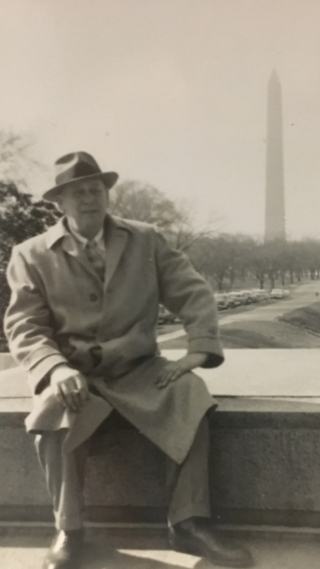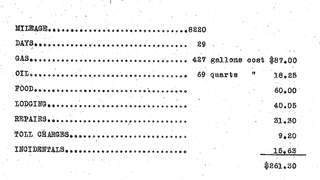Education
Learning from Past Generations
What my grandfather's 1932 trip across North America can teach us today.
Posted January 2, 2019
Between Monday, June 26 and August 1, 1933, my grandfather, Jesse James Trilling, and his friends Lou Steckler and "Goldie," left the Bronx to go on an adventure of over 9,000 miles. Their goal? Lake Louise deep in the Canadian Rockies. They had taken a similar trip which found them making it out to California between August 24 and September 21, 1932.

I didn't know my grandfather too well—he passed away when I was about five or six. I remember him as a large, gentle guy who always had a smile and a joke for everyone. Unlike all of my other New York ancestors, Jesse was born and partly raised in Missouri. And he literally was named after the outlaw, Jesse James. So I guess he was a little bit different. I have nothing but positive memories about him.
A few years ago, my mom gave me a unique gift. It was a travel journal from two trips that Grandpa Jesse had taken across the continent with some friends. These trips were done via automobile. They took a Ford (I'm not sure if there were many options back then) and each trip included more than 8,000 miles. The national park system in the US was relatively new at the time. These guys saw Mount Rushmore while it was under construction. And they toured Glacier National Park three years after it had opened, for instance.
The trips each cost about $300, which is kind of amazing to think about. Reading through this journal (found in full, here) got me thinking about what we have to learn from our familial history. We are, at the end of the day, products of the genes and culture of those who came before us.

The Wisdom of Past Generations
Sometimes, we try to reinvent the wheel without necessarily meaning to do so. And members of any generation have a tendency to get stuck thinking that they are, somehow, members of some kind of "enlightened" generation. I remember when our kids were little and my parents and in-laws would give us some thoughts on parenting. Somehow, we'd concluded that the way things are done "now" is somehow "the right way"—and so we didn't always take advice and guidance from folks who were in the older generation. I look back now and I think that's just plain stupid.
Experience is the ultimate teacher. And no matter how much you might think that you've got it "figured out," I've got news for you: You don't. No one does. The best we can ever achieve, really, is to approach having it figured out.
Reading about Grandpa Jesse's adventures across the country was pretty humbling for me. I had no idea that one of my direct ancestors was such an adventurer. He and his pals fished in Yellowstone, hiked in the Canadian Rockies, had a car broken into in Tuscon, saw a Hollywood movie premier at Grauman's Chinese Theater, and more. And I thought I lived a reasonably exciting life—Think again, Glenn!
Reading through this travel journal was like talking to my grandfather about our shared interest in adventuring. It was a way to see his perspective on the world. It was a way to connect with and learn from my immediate family history.
The Benefits of Reading Historical Documents
Another lesson that I got from reading this travel journal from the early 1930s pertains to the importance of reading primary historical documents. It's one thing to learn about segregation in the Deep South. It's quite another to read the first-person, extemporaneous thoughts of actual New Yorkers in the 1930s who are commenting on the South while they were traveling then and there. You could feel the divide between North and South in a visceral way in this writing. Their commentary on the "Indian reservations" of the West was very similar. It's one thing to read a second-hand account of how things were. But it's quite another thing to read a first-hand account. And only historical documents let us step back in time in this manner.
The Importance of Preserving Family History
Let's face it: Life is fleeting. We're all lucky to be here at all. And at the same time, we all realize that our time here is limited. Transcending yourself is largely what life is all about (see Kotre, 1984). Leaving your mark to positively affect future generations is, at the end of the day, the best we can hope to do.
From this perspective of generativity, then, preserving family history in all its forms is critical for allowing our ancestors to live on and influence our worlds today.
I have to say, I don't like clutter and I am often hesitant to take any physical objects that will add to the mass of stuff in my house or office. OK, I've said it: I hate stuff!
This said, when it comes to preserving family history, that's a little different. When my mom gave me Grandpa Jesse's travel journal, I immediately knew that this was a keeper. This journal taught me that adventuring is in my blood. It taught me how awe-inspring the continent of North America is. And it taught me that we are hardly living in the only "enlightened" time and place. Deep in the middle of the Great Depression, Grandpa Jesse and his pals had adventures that surpass anything I could hope to achieve during my lifetime. And they had a really wise perspective on the human experience that drips across the pages of the travel journal.
A lesson, then, is this: Take the time to preserve your family history. And take the time to learn from it.
"... it sure felt good to ride up Fifth Avenue."
I have to say, the other thing that I love about Grandpa Jesse's travel journal is how incredibly New York it is! These guys were New Yorkers through and through. In the last paragraph of the 1932 journal, after driving straight to the Bronx from Richmond, VA on September 21, 1932, the journal's author, Lou Steckler, writes this: ... it sure felt good to ride up Fifth Avenue.
They were New Yorkers, and this fact colors their experience. Their take on the South was completely as seen and experienced from the perspective of New Yorkers. Their appreciation for the expansive beauty of the West was fully from the perspective of New Yorkers. Their commentary on being not fully impressed by Los Angeles—so New York!
If you think that regionalism is somehow a unique part of the modern human experience, think again. An entire lesson of the travel journal, unto itself, speaks to how our own cultural background shapes how we see absolutely everything.
Bottom Line
In the early 1930's, Jesse James Trilling and a few close friends toured North America, driving thousands and thousands of miles. They saw Banff. They stayed in Reno, NV. They camped out in Yellowstone. They stayed at farmhouses in the Midwest. And more. I have no idea how they could afford all of this adventuring in terms of either time or money. But their travel journal lives on. This journal teaches us about the nature of North America in the early 1930s. But it also teaches us about the importance of learning from prior generations. It teaches us about the importance of preserving family history. It shows us how one's cultural background influences his or her take on just about everything. And it reminds us that the human experience cuts across time and place.
References
Kotre, J. (1984). Outliving the self. New York: Norton.




